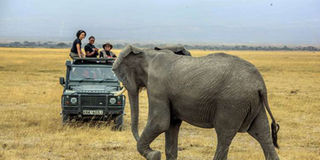Scientists fit elephants with tracking collars in Amboseli

First Lady Margaret Kenyatta (right), watching elephants in Amboseli National Park when she took her anti poaching campaign 'Hands off our elephants" to the park in the past. PHOTO | PSCU
What you need to know:
- The fitting of collars was conducted by a team of scientists, researchers and veterinarians from the Kenya Wildlife Service (KWS) in collaboration with the International Fund for Animal Welfare (IFAW).
- The new technology is aimed at giving wildlife managers an edge over poachers and human elephant conflict which is increasingly getting critical to the safeguarding of elephants in the Amboseli ecosystem.
Two elephants in the Amboseli ecosystem have been fitted with tracking collars to map out their migratory routes in an effort to protect them from poachers.
The fitting of collars was conducted by a team of scientists, researchers and veterinarians from the Kenya Wildlife Service (KWS) in collaboration with the International Fund for Animal Welfare (IFAW).
The new technology is aimed at giving wildlife managers an edge over poachers and human elephant conflict which is increasingly getting critical to the safeguarding of elephants in the Amboseli ecosystem.
Sospeter Kiambi, the Elephant Programme Coordinator at KWS, said that the tracking collar provides an effective tool to monitor the movement of crop raiding animals and help put an early warning mechanism to reduce conflicts associated with crop raids.
“In addition to understanding the spatial and temporal habitat utilization by elephants from satellite collars, advancement in technology has allowed the use of satellite collar information to improve on elephant law enforcement, through immobility alerts and geo-fencing,” said Kiambi.
The collars transmit a satellite and radio signal using global positioning system (GPS) technology to map out the elephants’ migratory routes and identify how expansively the elephants travel in search of water and pasture.
The animal welfare organization President and CEO Azzedine Downes said that the information gathered by the gadget is used to give a view of optimum lifestyle standards for the giant creatures.
“We will be able to make a case for the connection of their favoured habitats by securing critical corridors and securing the areas that are essential for sustaining Amboseli’s rich wildlife heritage, especially the elephants,” he said.
IFAW in conjunction with KWS has so far collared 12 elephants in Amboseli. The information gleaned from the 12 collars indicates that the elephants have traversed over 17,000 square kilometers from Magadi and Suswa in the west to Tsavo West in the East.
The findings also indicate that some of the collared elephants have been identified to frequent and forage close to electrically fenced farmlands showing that collaring can be an effective tool in preventing conflict between the animals and humans.
The IFAW-KWS study is part of IFAW’s Amboseli Project, which includes enhancing KWS’ law enforcement capabilities, leasing critical corridors and dispersal areas in community land, creating conservation awareness and local capacity for ecotourism ventures, and mitigating human-elephant conflict.





